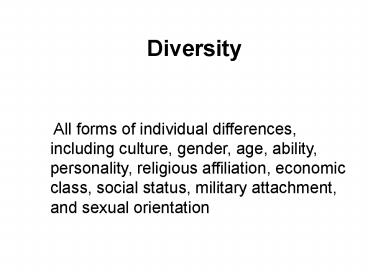Diversity - PowerPoint PPT Presentation
1 / 16
Title:
Diversity
Description:
... defines how we look at life, and guides how we respond to different people and situations ... The business care for diversity is complex to establish ... – PowerPoint PPT presentation
Number of Views:25
Avg rating:3.0/5.0
Title: Diversity
1
Diversity
All forms of individual differences,
including culture, gender, age, ability,
personality, religious affiliation, economic
class, social status, military attachment, and
sexual orientation
2
Dimensions of Diversity
Primary Secondary
- Educational background
- Income
- Geographic location
- Marital status
- Military experience
- Religious beliefs
- Work experience
- Parental status
- Age
- Ethnicity
- Gender
- Physical abilities/qualities
- Race
3
- Culture tells us who we are, defines how we look
at life, and guides how we respond to different
people and situations - Differences within and among
- Change and evolve
- Organizational cultures are reflected in the way
that they manage people
4
Stereotypes, Prejudice, and Discrimination
- Stereotypes?
- Prejudice is an attitude
- How prejudice develops
- Discrimination is a behavior
5
Building a Business Case for Diversity
- The business care for diversity is complex to
establish - Diversity initiatives are long-term investments
in short-term environments - Payback can be somewhat intangible and
unpredictable - Organizations use different definitions of
diversity
6
Building a Business Case for Diversity
- Structuring the case for diversity by linking
these reasons with business objectives - Determine business objectives or needs related to
diversity - Determine the actions that the organization needs
to take to achieve these objections - Focused approach short-term using targeted
specific objectives - Comprehensive approach long-term involving
multiple targets and objectives
7
Building a Business Case for Diversity
- Structuring the case for diversity by linking
these reasons with business objectives
(continued) - Determine the costs and benefits of the planned
initiatives - Develop a tracking system to measure and evaluate
the program - Outcome measures show financial implications
and long-term results tied to business objectives
8
Building a Business Case for Diversity
- Building a business case for diversity requires
that it be linked to strategic business
objectives - Business reasons for managing diversity
- Cost savings
- Attracting and retaining talent
- Optimizing the benefits of diversity
- Marketplace
- Creativity
- Teamwork
9
Building a Business Case for Diversity
- Structuring the business case for diversity
- Objectives of the organization
- Short and long-term goals
- Cost benefits
- Tracking results
- Assessing progress/process
- Assessing progress/outcomes
10
Resistance to Change
Slower Decision- Making
Diversity Problems
Possibility of Conflicts
Lack of Cohesiveness
Communication Problems
11
Diversity in the Workplace Ethics, Pragmatism,
or Some of Both?
- Ethics is a process
- Can the process of implementing diversity
initiatives in the workplace be ethical and
practical at the same time? - Economic arguments for diversity relate to
business outcomes not ethics - Market driven/globalization
- Demographic changes in terms of labor pool
availability - Increased creativity range or perspectives
- Resource base theory of the firm
12
Categories of Ethical Theories
13
The Pragmatic and the Ethical with Regard to
Diversity
Pragmatic
Quadrant IV
Quadrant I
Quadrant III
Quadrant II
Non-pragmatic
14
Questions for a Discussion of Ethical Aspects of
Decisions
- Have you defined the problem accurately?
- How would you define the problem if you stood on
the other side of the fence? - How did this situation occur in the first place?
- To whom and what do you give your loyalties as a
person and as a member of the corporation? - What is your intention in making this decision?
15
Questions for a Discussion of Ethical Aspects of
Decisions(continued)
- How does this intention compare with the likely
results? - Whom could your decision or action injure?
- Can you engage the affected parties in a
discussion of the problem before you make your
decision? - Are you confident that your position will be as
valid over a long period of time as it seems now?
16
Questions for a Discussion of Ethical Aspects of
Decisions(continued)
- Could you disclose without a qualm your decision
or action to your boss, your CEO, the board of
directors, your family, or society as a whole? - What is the symbolic intention of your action if
understood? If misunderstood? - Under what conditions would you allow exceptions
to your stand?































